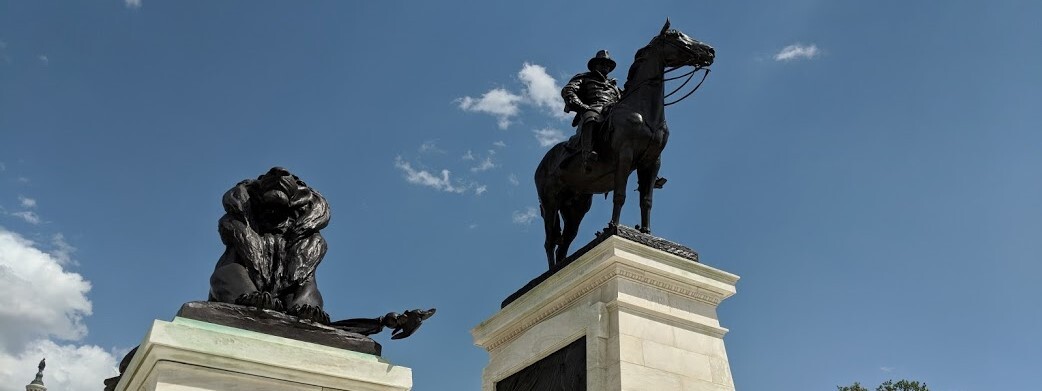Working Historians is a podcast series that showcases the work and careers of historians in a wide variety of career fields. We hope to introduce history students and the general public to the career paths available to people who study history, introduce and promote historians to students and the public, and showcase the work that historians do on a regular basis. Hosts Rob Denning and Jimmy Fennessy can be reached at workinghistorians@gmail.com.
Working Historians is a podcast series that showcases the work and careers of historians in a wide variety of career fields. We hope to introduce history students and the general public to the career paths available to people who study history, introduce and promote historians to students and the public, and showcase the work that historians do on a regular basis. Hosts Rob Denning and Jimmy Fennessy can be reached at workinghistorians@gmail.com.
Episodes

Thursday May 30, 2019
Adrian Calamel - The Arab Spring Episode 5 - Conclusions
Thursday May 30, 2019
Thursday May 30, 2019
Dr. Adrian Calamel is a professor at Finger Lakes Community College. In this five-episode series, Dr. Calamel is discussing the recent Arab Spring phenomenon in the Middle East. In this final episode, we discuss developments in Tunisia, Egypt, Yemen, Libya, and Syria up to the present day.
Further Readings
Books
1. Eric Trager, Arab Fall: How the Muslim Brotherhood Won and Lost Egypt in 891 Days (Washington, D.C.: Georgetown University Press, 2016).
2. Fouad Ajami, The Syrian Rebellion (Stanford: Hoover Institution Press, 2012).
3. Robert F. Worth, A Rage for Order: The Middle East in Turmoil, from Tahrir Square to ISIS (New York: Macmillan, 2016).
4. Ibrahim Fraihat, Unfinished Revolutions: Yemen, Libya, and Tunisia after the Arab Spring (Yale University Press, 2016).
5. Christopher Phillips, The Battle for Syria: International Rivalry in the New Middle East (New Haven: Yale University Press, 2016).
6. Peter Cole and Brian McQuinn, The Libyan Revolution and its Aftermath (Oxford: Oxford University Press, 2015).
Articles
1. Anthony H. Cordesman, “Stability and Security in Egypt, Libya, Tunisia, and the Rest of the MENA Region”, Center for Strategic and International Studies (CSIS), Nov. 8, 2011
2. Fouad Ajami, “The Arab Spring at One A Year of Living Dangerously” Foreign Affairs, Mar 1, 2012.
3. “Planning for a Post-Gadhafi Libya”, Center for Strategic and International Studies (CSIS), July 25, 2011
4. Kamal Eldin Osman Salih, “The Roots and Causes of the 2011 Arab Uprisings” Arab Studies Quarterly, Vol. 35, No. 2 (Spring 2013), pp. 184-206
5. Fouad Ajami, “Tracking the Arab Spring: The Best Day After a Bad Emperor is the First,” Center for International and Regional Issues” CIRS Newsletter, Fall 2011, No. 11
6. DB Research Deutsche Bank, “Two years of Arab Spring Where are we now? What’s next?” Emerging Markets, Jan. 25, 2013
7. Eric Trager, “Egypt's Looming Competitive Theocracy” The Hudson Institute, Dec. 27, 2012
8. Alexis Arief, Carla E. Humud “Political Transition in Tunisia” Congressional Research Service, Feb. 10, 2015 R

Thursday May 16, 2019
Adrian Calamel - The Arab Spring Episode 4 - Syria
Thursday May 16, 2019
Thursday May 16, 2019
Dr. Adrian Calamel is a professor at Finger Lakes Community College. In this five-episode series, Dr. Calamel is discussing the recent Arab Spring phenomenon in the Middle East. In this fourth episode, he discusses how the Arab Spring played out in Syria.

Thursday May 02, 2019
Adrian Calamel - The Arab Spring Episode 3 - Yemen and Libya
Thursday May 02, 2019
Thursday May 02, 2019
Dr. Adrian Calamel is a professor at Finger Lakes Community College. In this five-episode series, Dr. Calamel is discussing the recent Arab Spring phenomenon in the Middle East. In this third episode, he discusses the event’s significance for Yemen and Libya.

Sunday Apr 21, 2019
Adrian Calamel - The Arab Spring Episode 2 - Tunisia and Egypt
Sunday Apr 21, 2019
Sunday Apr 21, 2019
Dr. Adrian Calamel is a professor at Finger Lakes Community College. In this five-episode series, Dr. Calamel is discussing the recent Arab Spring phenomenon in the Middle East. In this second episode, he discusses the event’s significance for Tunisia and Egypt.

Friday Apr 05, 2019
Adrian Calamel - The Arab Spring Episode 1
Friday Apr 05, 2019
Friday Apr 05, 2019
Dr. Adrian Calamel teaches history at Finger Lakes Community College. In this five-episode series, Dr. Calamel is discussing the recent Arab Spring phenomenon in the Middle East. In this first episode, he discusses the overall timeline and significance for the Arab Spring throughout the region.
